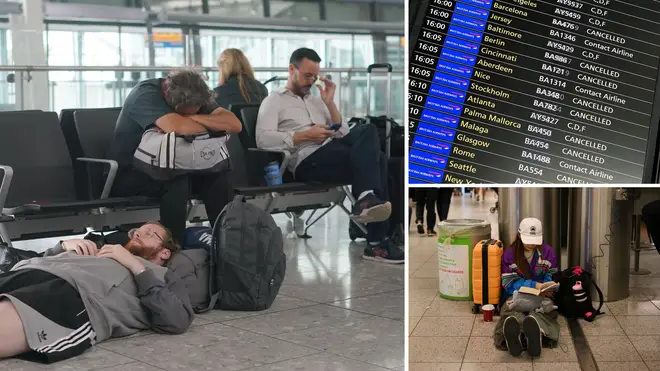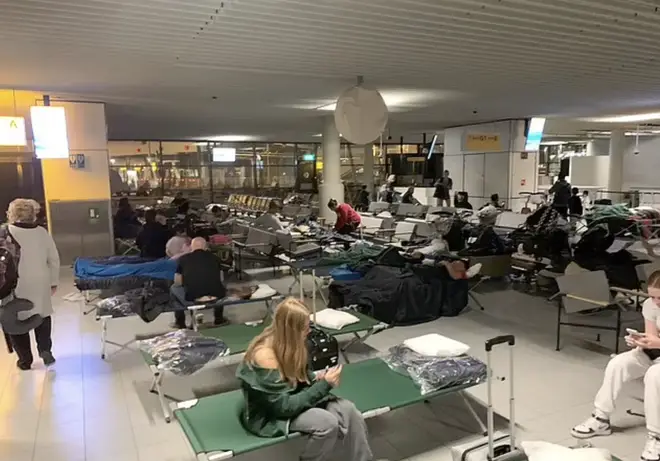
Nick Abbot 10pm - 1am
30 August 2023, 16:55

Ageing computer systems have been blamed for the air traffic control meltdown which has caused chaos in airports.
The disruption, which began on Monday, is understood to have been caused by a single flight plan - but continues to cause travel chaos three days on.
Basic information such as flight numbers, aircraft types, destinations and routes are needed for displays. If they are not formatted correctly the computer may not recognise the data, resulting in a system collapse.
Stranded holidaymakers are now facing waits of up to 10 days for flights home, leaving them with no choice but to sleep on airport floors while they await updates or foot the bill of staying in accommodation.
Airlines have been criticised for not organising hotel rooms for those impacted.
Thousands have been affected by the technical glitch that hit UK airspace earlier in the week, with analysis showing at least 281 flights were cancelled on Tuesday at the UK's six busiest airports.

Flight data received by air traffic services ’caused control fault’
Michele Robson, who has worked in air traffic control for more than 20 years, said something as simple as the wrong number of dots used in the old system could have been behind the chaos.
"When there have been failures in the past, it's normally something to do with a bad information that's been input in the incorrect format," she told Sky's daily podcast.
"It's a very old system, it's been running for many years and generally we've been very lucky and we don't often have failures, or if we do, we get it back during that backup time, which is what it's there for.
"There have been other instances where something has been incorrectly formatted and the flight plan computer behaves in a way they're not expecting and effectively causes it to a fail, so that could be enough to potentially crash the system in effect if it was formatted incorrectly.
"You have to space things in a certain way using a certain number of dots, as an example. They do it in a very unique way that's never been done before, otherwise it would happen every day.
"So it has to be something pretty unusual that they've input for it to happen, but it's an old system and perhaps something was input yesterday that it's never seen before and that's what caused it to have this reaction where it's failed."

Flight delays continue following air traffic control issues
It comes after the systems' boss said the chaos was triggered by an "unusual piece of data".
Martin Rolfe, the chief executive of National Air Traffic Services (Nats), said even junk data like that sent to the system cannot just be discarded like spam because of the key safety role controllers play.
The fault forced Nats to input information manually, leading to a reduction in flight plans that has caused hundreds of cancelled and delayed flights and affected hundreds of thousands of passengers since Monday.
Rolfe said on Wednesday: "It wasn't an entire system failure. It was a piece of the system, an important piece of the system.
"But in those circumstances, if we receive an unusual piece of data that we don't recognise, it is critically important that that information - which could be erroneous - is not passed to air traffic controllers."
He told the BBC: "Our systems are safety-critical systems, they are dealing with the lives of passengers and the travelling public.
"So even things like just throwing data away needs to be very carefully considered.
"If you throw away a critical piece of data you may end up in the next 30 seconds, a minute or an hour with something that then is not right on the screens in front of the controller.
"So it is nothing like throwing away spam."
Some passengers may have to wait as long as two weeks for their return flights home, The Sun reports.
One couple, Ken Blanks and his wife Lisa, say they have been told their next available flight back from Gran Canaria is in 12 days.
"I've finished my holiday but there's nobody from easyJet talking to us," he told the publication.
"The next flight is in 12 days so we're stuck here. The airport offered some families hotels but they have to keep getting taxis there and back. It’s 200 euros from the airport."

Neil Scott, from Newcastle, told LBC he could be stuck in Faro, Portugal, for a week after the air traffic control glitch.
He was set to fly to Glasgow on Monday evening and then head home but now EasyJet have offered them an alternative flight on September 5.
Neil said he will have to take unpaid leave from his social care job if they have to stay until then, and his wife will be late back to her job at a school.
The pair are on holiday with their two teenage sons who also face missing school.
Because he was offered a replacement flight on September 5 by his airline, he cannot book alternative flights and then claim a refund.
Neil said he was left with the possibility of taking unpaid leave as he cannot get home for at least a week.
Rolfe has already said there are no indications that the failure was caused by a cyber-attack and said systems have been running normally since Monday afternoon.
He added: "We are already working closely with them to provide a preliminary report to the Secretary of State for Transport on Monday.
"The conclusions of this report will be made public."
The initial problem was repaired within hours on Monday but the travel chaos is expected to last for some time.
The fault was "identified and remedied" but the backlog of flights meant passengers face days of disruption in the final part of the summer holidays.